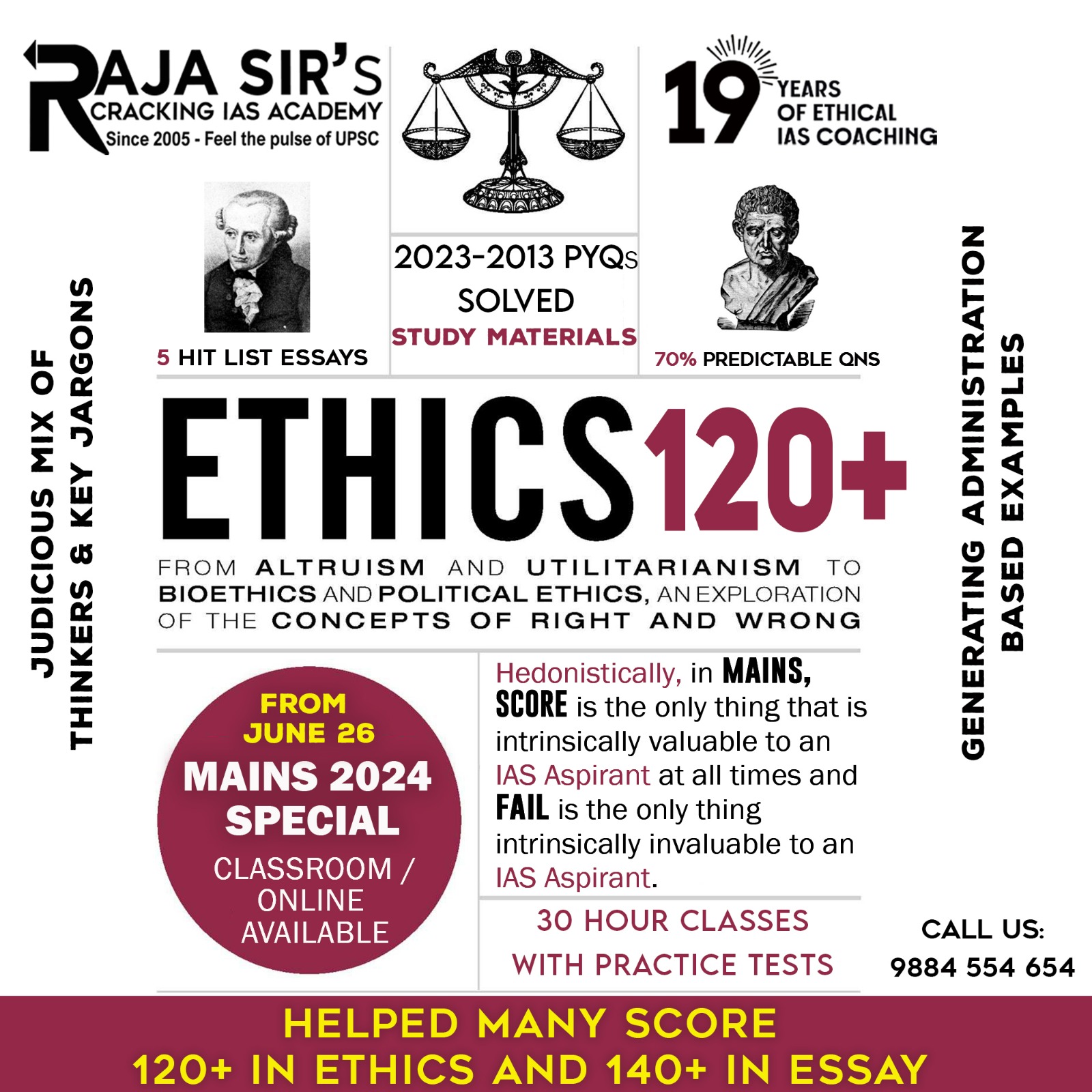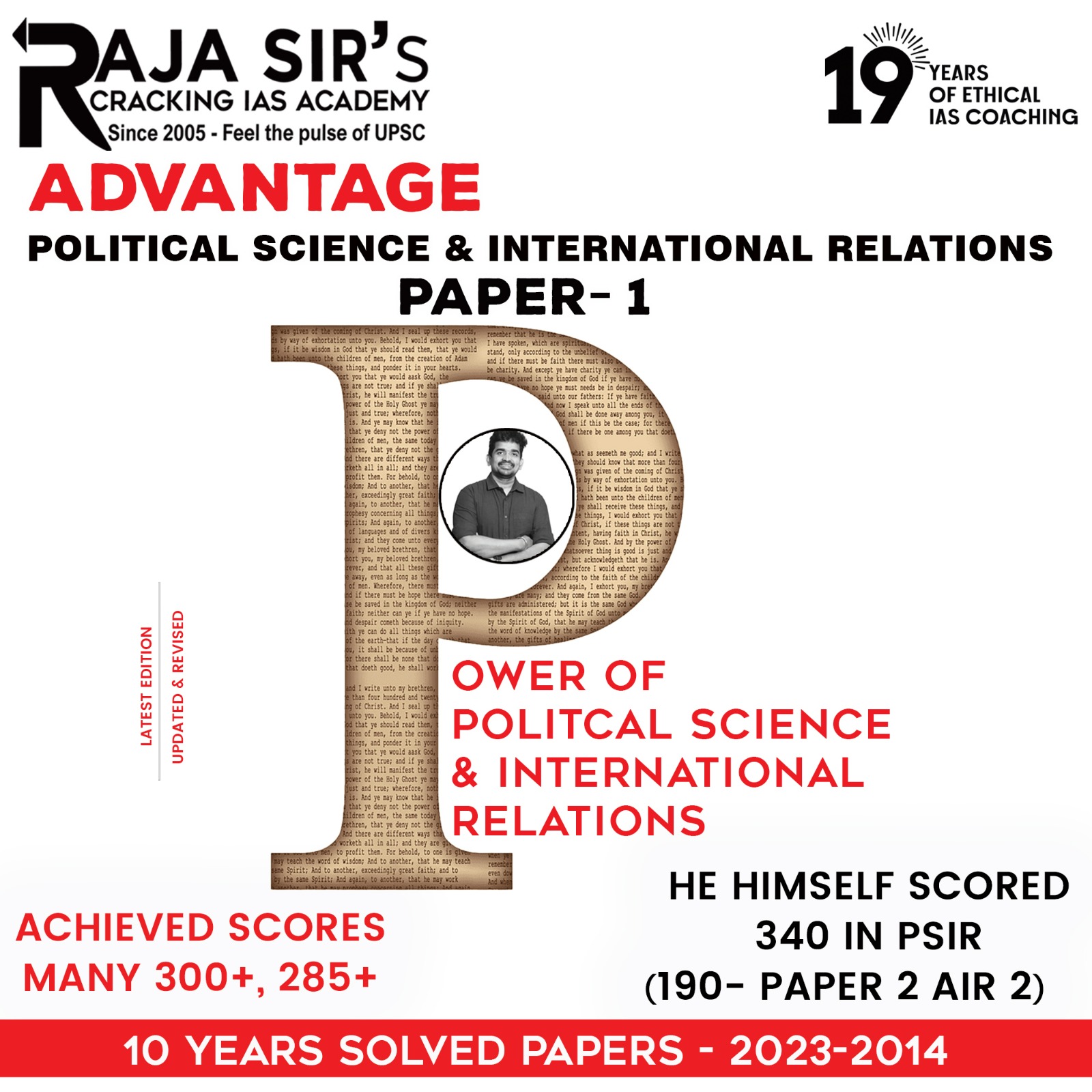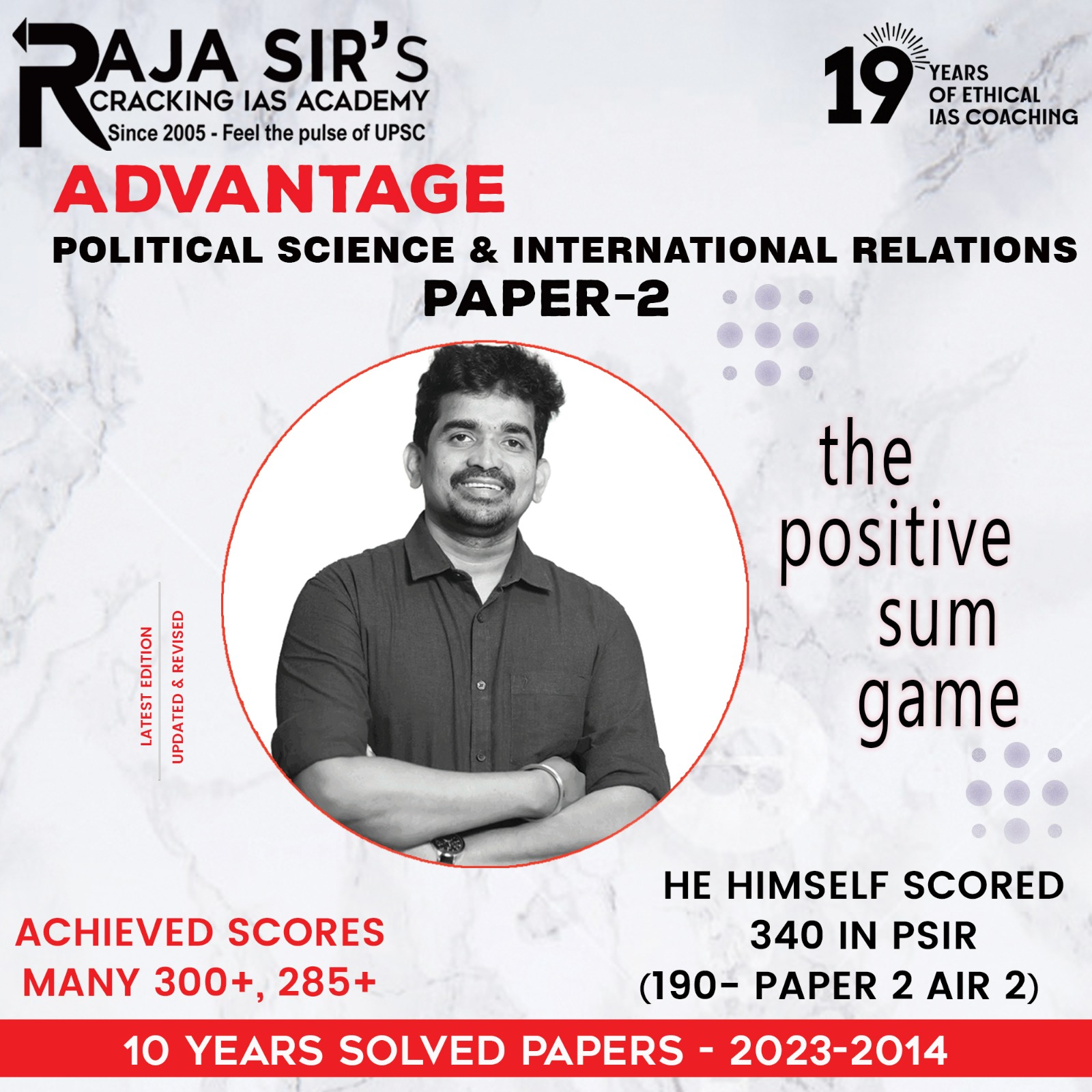- Home
- Prelims
- Mains
- Current Affairs
- Study Materials
- Test Series
 EDITORIALS & ARTICLES
EDITORIALS & ARTICLES
Hit List Questions 4 - PPP100 PRELIMS 2024 - 22
|
1. |
1. Article 15 (4) and Article 16 (4) form the basis for reservation in education and employment. 2. In K. Krishnamurthy (Dr.) v. Union of India (2010), the Supreme Court interpreted Article 243D(6) and Article 243T(6), which permit reservation by enactment of law for backward classes in panchayat and municipal bodies respectively. Which of the above statements is/are correct w.r.t. OBC Reservation? (a) 1 only (b) 2 only (c) Both 1 and 2 (d) Neither 1 nor 2
|
|
2. |
South Col a Mountain pass is in (a) Siachen (b) Doklam (c) China (d) Nepal
|
|
3. |
Which of the following statements are correct with reference to the United Nations Statistical Commission? 1. It is a Functional Commission of the UN Economic and Social Council. 2. The member countries of the commission are elected by the UNCTAD. 3. It has 63 members. Select the correct answer using the codes given below: (a) 1 only (b) 2 only (c) 3 only (d) 1, 2 and 3
|
|
4. |
Identify the incorrect statement. (a) In 1981 Justice P. N. Bhagwati in .S. P. Gupta v. Union of India, 1981 case, articulated the concept of Public Interest Litigation. (b) In Murli S. Dogra v. Union of India case the Supreme Court banned smoking in public places. (c) The test of proportionality to the population is mandated by the Constitution in Article 330. (d) Second Administrative Reforms Commission was headed by Shri.V.K.Iyer.
|
|
5. |
In India, substantial amount of tiger population can be found in 1. Shivalik hills 2. Brahmaputra flood plains 3. North eastern hills (a) 2 Only (b) 1 only (c) 2, 3 (d) 1, 2, 3 |
|
6. |
1. It monitors air pollutants. 2. It will be hosted on an Intelsat communications satellite in geostationary orbit. Which of the statements given above is/are correct regarding NASA’s TEMPO project?. (a) 1 only (b) 2 only (c) Both 1 and 2 (d) Neither 1 nor 2
|
|
7. |
The Writ of Prohibition, as per Article 32, cannot be issued against 1) judicial authorities 2) quasi-judicial authorities 3) administrative authorities 4) private authorities (a) 1 and 2 only (b) 1 and 3 only (c) 1, 2 and 3 only (d) 3 and 4 only
|
|
8. |
‘Dabba trading’ seen in the news refer to (a) a form of short-term trading in Stock exchanges w.r.t. Food Processing firms. (b) a type of informal trading (c) a type of trading that focuses on agro based co-operative societies. (d) a form of insider trading.
|
|
9. |
Alma-Ata Declaration 1978 is related to (a) Healthcare (b) Biological weapons (c) Gender equality (d) Child labour code |
|
10. |
Consider the following statements w.r.t. Milk: 1. Milk doesn’t have any goods and services tax. 2. Dairies cannot claim input tax credit. Which of the statements given above is/are correct? (a) 1 and 2 are correct and 1 is the reason for 2. (b) 1 and 2 are correct but 1 is not the reason for 2. (c) Only 1 is correct. (d) Only 2 is correct.
|
|
11. |
Which of the following are reasonable restrictions on the freedom of speech and expression under Article 19(2) of the Constitution of India? 1. Sovereignty and integrity of India 2. Public order 3. Decency or morality 4. Defamation Select the correct answer using the code given below: (a) 1, 2, and 3 only (b) 1, 2, and 4 only (c) 2, 3, and 4 only (d) 1, 2, 3, and 4
|
|
12. |
Climate smart agriculture includes 1. Conservation Agriculture 2. Natural Farming 3. Organic Farming 4. Precision Agriculture 5. Regenerative Agriculture (a) 1,2,3,4,5 (b) 1,2,3,5 (c) 1,2,4,5 (d) 1,2,3,4 |
|
13. |
Lead, ingested or inhaled, is a health hazard. After the addition of lead to petrol has been banned, what still are the sources of lead poisoning? 1. Smelting units 2. Pens and pencils 3. Paints 4. Hair oils and cosmetics Select the correct answer using the codes given below: (a) 1, 2 and 3 only (b) 1 and 3 only (c) 2 and 4 only (d) 1, 2, 3 and 4
|
|
14. |
Consider the following statements: 1. Article 15 prohibits discrimination on the grounds of religion, race, caste, gender, or place of birth. 2. Fundamental right under Article 15 is available only to citizens and not to foreigners. Which of the above statements is/are correct?. (a) 1 only (b) 2 only (c) Both 1 and 2 (d) Neither 1 nor 2
|
|
15. |
Which of the following international convention(s) deal(s) with nuclear liability? 1. Convention on Supplementary Compensation for Nuclear Damage 2. Vienna Convention (1963) 3. Convention on Nuclear Safety 4. The Paris Convention on Third-Party Liability (1960) (a) 1, 2 and 3 only (b) 1 and 2 only (c) 1, 2 and 4 only (d) 1, 2, 3 and 4
|
|
16. |
Exercise Ajeya Warrior is conducted between India and (a) Mongolia (b) France (c) United Kingdom (d) Tajikistan
|
|
17. |
Which one of the following statements regarding the current status of the relationship between Fundamental Rights and Directive Principles is correct? (a) Directive Principles cannot get priority over Fundamental Rights in any case (b) Directive Principles always get priority over Fundamental Rights (c) Fundamental Rights always get priority over Directive Principles (d) In some cases Directive Principles may get priority over Fundamental Rights
|
|
18. |
International Organization Partners of the Ramsar Convention include 1. Birdlife International 2. International Union for Conservation of Nature 3. Wetlands International 4. WWF (a) 1, 2, 3, 4 (b) 1, 2, 3 (c) 1, 3 (d) 1, 3, 4
|
|
19. |
“Lyrids” seen in news refer to (a) Corals (b) Virus (c) Mangrove trees (d) None of these
|
|
20. |
The Right to Freedom under Article 19 of the Constitution of India may be suspended by the President of India (a) at any time, he desires so (b) under Article 356 (c) under Article 352 (d) under Article 360
|
|
21. |
Consider the following statements w.r.t. Hakki Pikki. 1. They are a semi-nomadic tribe, traditionally of bird catchers and hunters. 2. They prefer cross-cousin marriages. 3. Their society is patriarchal. Select the correct answer code: (a) 3 Only (b) 1 and 2 only (c) 2, 3 (d) 1, 2, 3
|
|
22. |
Which of the following organisation/s has established 30th March 2023 as the first-ever International Day of Zero Waste? 1. United Nations Environment Programme (UNEP) 2. International Union for Conservation of Nature (IUCN) 3. Intergovernmental Panel on Climate Change (IPCC) 4. UN Human Settlements Programme (UN-Habitat) (a) 4 only (b) 2 and 3 only (c) 1 and 3 only (d) 1 and 4 only
|
|
23. |
Which one of the following cases prompted the Indian Parliament to enact 24th Constitution Amendment Bill? (a) Golaknath case (b) Shankari Prasad case (c) Keshvananda Bharati case (d) Shah Bano case
|
|
24. |
Consider the following statements w.r.t. Preventive detention. 1. The legislative power over preventive detention is divided between the Parliament and the state legislatures under the Constitution. 2. Article 22(1) of the Constitution provides for preventive detention laws; and Article 22(2) contain the following safeguards against abuse of this power. 3. The 44th Amendment Act of 1978 has reduced the period of detention without obtaining the opinion of an advisory board from three to two months. Select the correct statement(s): (a) 3 only (b) 1 and 3 only (c) 1 and 2 only (d) 1, 2, 3
|
|
25. |
Consider the following statements w.r.t. The Prevention of Insults to National Honour Act, 1971: 1. It prohibits the desecration of or insult to the country’s national symbols, including the national flag, the Constitution, the national song and the Indian map. 2. A person who is convicted for the following offences under the Act is disqualified to contest in the elections to the Parliament and state legislature for 6 years. Which of the above statements is/are correct?. (a) 1 only (b) 2 only (c) Both 1 and 2 (d) Neither 1 nor 2 |
KEYS & EXPLANATIONS
|
1. |
C |
|||||||||||||||||||||||||
|
2. |
https://www.thehindu.com/sci-tech/microbes-at-the-top-of-the-world/article66763943.ece |
D |
||||||||||||||||||||||||
|
3. |
United Nations Statistical Commission:
|
A |
||||||||||||||||||||||||
|
4. |
The Second Administrative Reforms Commission (ARC) was constituted on 31 August 2005, as a Commission of Inquiry, under the Chairmanship of Veerappa Moily for preparing a detailed blueprint for revamping the public administrative system.
|
D |
||||||||||||||||||||||||
|
5. |
D |
|||||||||||||||||||||||||
|
6. |
C |
|||||||||||||||||||||||||
|
7. |
Writ of Prohibition means to forbid ‘. It is issued by a higher court to a lower court or tribunal to prevent the latter from exceeding its jurisdiction or usurping a jurisdiction that it does not possess. Thus, unlike mandamus that directs activity, the prohibition directs inactivity. The writ of prohibition can be issued only against judicial and quasi-judicial authorities. It is not available against administrative authorities, legislative bodies, and private individuals or bodies. |
D |
||||||||||||||||||||||||
|
8. |
B |
|||||||||||||||||||||||||
|
9. |
A |
|||||||||||||||||||||||||
|
10. |
https://indianexpress.com/article/explained/explained-economics/a-big-fat-problem-in-milk-8559975/ |
B |
||||||||||||||||||||||||
|
11. |
Article 19(2) of the Constitution of India allows the State to impose reasonable restrictions on the freedom of speech and expression on the grounds of the sovereignty and integrity of India, the security of the State, friendly relations with foreign States, public order, decency or morality, contempt of court, defamation, or incitement to an offense.
However, criticism of government policy is not a valid ground for imposing restrictions on the freedom of speech and expression. The Supreme Court has held that criticism of government policy is an essential part of democratic governance and falls within the ambit of the freedom of speech and expression.
|
D |
||||||||||||||||||||||||
|
12. |
A |
|||||||||||||||||||||||||
|
13. |
B |
|||||||||||||||||||||||||
|
14. |
Article 15 prohibits discrimination on the grounds of religion, race, caste, sex, or place of birth.
|
B |
||||||||||||||||||||||||
|
15. |
International Conventions on nuclear liability · Nuclear liability law is not uniform across the world. Different countries have adopted different national laws and regulations on nuclear liability, and some have also joined international conventions that establish common rules and standards on nuclear liability. · Some of the most important international conventions on nuclear liability are: o The Paris Convention on Third-Party Liability in the Field of Nuclear Energy (1960) and its supplementary protocols o The Vienna Convention on Civil Liability for Nuclear Damage (1963) and its supplementary protocols o The Convention on Supplementary Compensation for Nuclear Damage (1997) o The Joint Protocol Relating to the Application of the Vienna Convention and the Paris Convention (1988) · These conventions aim to harmonize the national laws of their contracting parties and to provide a framework for international cooperation and mutual assistance in case of a nuclear incident. · They also set minimum amounts of liability coverage that operators must have, and establish mechanisms for compensating damage that exceeds those amounts.
|
C |
||||||||||||||||||||||||
|
16. |
C |
|||||||||||||||||||||||||
|
17. |
D |
|||||||||||||||||||||||||
|
18. |
https://www.ramsar.org/about/partnerships/international-organization-partners |
A |
||||||||||||||||||||||||
|
19. |
D |
|||||||||||||||||||||||||
|
20. |
|
C |
||||||||||||||||||||||||
|
21. |
B |
|||||||||||||||||||||||||
|
22. |
D |
|||||||||||||||||||||||||
|
23. |
A |
|||||||||||||||||||||||||
|
24. |
Article 22 This article provides for the protection of the life and personal liberty of individuals and lays down the procedure for preventive detention. According to this article, no person can be detained without being informed of the grounds for such detention, and no person can be detained for more than three months without a judicial review. Article 22(2) This clause requires the state to provide for a judicial review of the detention within a period of five weeks from the date of detention unless the individual is otherwise released earlier. Article 22(3) This clause allows for the detention of individuals without a trial in certain circumstances, such as when a state of emergency has been declared. Article 22(4) This clause provides that any person who is detained under preventive detention laws has the right to be represented by a legal practitioner of their choice, and has the right to be informed of the grounds for their detention. Article 22(5) This clause requires the government to keep a record of all detentions and to place this record before both houses of Parliament. The 44th Amendment Act of 1978 has reduced the period of detention without obtaining the opinion of an advisory board from three to two months. However, this provision has not yet been brought into force, hence, the original period of three months still continues. |
B |
||||||||||||||||||||||||
|
25. |
It prohibits the desecration of or insult to the country’s national symbols, including the national flag, the Constitution, the national anthem and the Indian map. Prevention of Insults to National Honour Act, 1971, has provisions aimed at preventing the desecration or insult of national symbols, including the national flag, the Constitution, the national anthem, and the Indian map. Section 2 – Insults to Indian National Flag and Constitution:
Explanation 1:
Explanation 2:
Explanation 3:
Explanation 4 – Definition of “disrespect” to the Indian National Flag:
Section 3 – Prevention of singing of National Anthem:
Section 3A – Enhanced penalty on second and subsequent convictions:
These provisions aim to uphold the honor and dignity of national symbols, but their interpretation and enforcement should be balanced to ensure they do not unduly restrict freedom of expression and peaceful dissent. |
B |









 Latest News
Latest News



 General Studies
General Studies